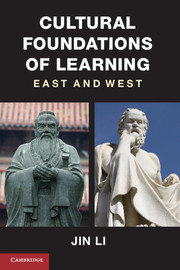Book contents
- Frontmatter
- Contents
- Preface
- 1 Faust and the Birth of a Research Agenda
- 2 Learning to Master the Universe and to Transform Self
- 3 Time Past and Time Present
- 4 Mind-Oriented and Virtue-Oriented Learning Processes
- 5 Curiosity Begets Inquiry and Heart Begets Dedication
- 6 Nerd’s Hell and Nerd’s Haven
- 7 Socratic and Confucian Tutors at Home
- 8 The Devil’s Advocate and the Reluctant Speaker
- 9 Implications for the Changing Landscape of Learning
- Bibliography
- Index
- References
6 - Nerd’s Hell and Nerd’s Haven
Published online by Cambridge University Press: 05 June 2012
- Frontmatter
- Contents
- Preface
- 1 Faust and the Birth of a Research Agenda
- 2 Learning to Master the Universe and to Transform Self
- 3 Time Past and Time Present
- 4 Mind-Oriented and Virtue-Oriented Learning Processes
- 5 Curiosity Begets Inquiry and Heart Begets Dedication
- 6 Nerd’s Hell and Nerd’s Haven
- 7 Socratic and Confucian Tutors at Home
- 8 The Devil’s Advocate and the Reluctant Speaker
- 9 Implications for the Changing Landscape of Learning
- Bibliography
- Index
- References
Summary
Modern formal learning takes place with age-graded peers. Peers, therefore, are a significant social context for child development. When children depart early childhood and enter middle childhood (approximately between ages six and twelve), they become more oriented toward the social world beyond their family. However, in the modern world, the beginning of middle childhood coincides with the onset of schooling. Therefore, the major shift in children’s social world is from home to school. Although they have less parental supervision, they continue to be supervised by schoolteachers and other school staff. What is dramatically changed is that children now spend much of their daily time with same-age peers.
Much developmental research documents the significant role peer context plays in child development. Middle childhood is a period during which children’s mental capacity increases (in addition to their increased physical capacity), particularly in the area of social cognition. Whereas they are less able to appreciate how other people’s minds work, they now are more sophisticated in their understanding. They now realize that what they know may not be known by others and what they see may not be seen by others; that is, other people have their own minds and do their own thinking. They become increasingly sophisticated in their ability to take new perspectives. They can anticipate, interpret, and explain others’ desires, thoughts, and actions more accurately, independent of what they themselves desire, think, and do. Socially, they experience intensive peer interactions. They become interested in peer relationships, friendship, and their own social standing among peers, but at the same time, they care about their own quality, competence, and independence.
- Type
- Chapter
- Information
- Cultural Foundations of LearningEast and West, pp. 187 - 222Publisher: Cambridge University PressPrint publication year: 2012



